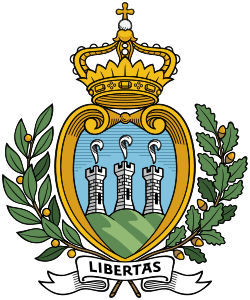The Statutes of 1600
The current legal system of the San Marino began on 8 October 1600. The government gave binding force to a compilation of Statuti written by Camillo Bonelli, covering the institutions and practices of Sammarinese government and justice at that time. It was written in Latin and contained in six books. The title in Latin is Statuta Decreta ac Ordinamenta Illustris Reipublicae ac Perpetuae Libertatis Terrae Sancti Marini.
The new system was an update on the Statuti Comunali (Town Statute) which had served San Marino from about 1300. Existing institutions, such as the Council of the Sixty, were carried forward from this period. The Statutes form the basis of all law in effect today, and so it may be the oldest constitution of any existing nation.
Book One
The first book contains 62 articles. It is constitutional in character and describes the various councils of San Marino, courts, a number of administrative positions, including the Captains-Regent, and the powers assigned to them. The last two articles explain how the law is to be interpreted and altered, including how the law is to be promulgated.
Book Four
The fourth book, called De Appellationibus, contains 15 articles. The volume explains how judges are nominated, the classification of sentences, appeals and appellant guarantees.
Book Five
The fifth book, called Extraordinarium, contains 46 articles covering a range of topics. These include the sale of meat, sanitation and health, water reserves and roads.
Declaration of Citizen Rights
On 12 July 1974 the Captains-Regent signed a law (59/1974) adopted by the Grand and General Council containing a declaration of citizen rights and the fundamental principles of the juridical order of San Marino. The Declaration begins with a repudiation of war. It states the people are sovereign and explains how the separation of powers doctrine is applicable to San Marino. Citizens are guaranteed certain rights including equality, inviolability, freedom, and universal suffrage.
Jorri Duursma describes the 1974 law as the fundamental law of the Republic. [2]
The Declaration was amended in 2002, providing further constitutional detail on the organisation of government and establishing the Guarantors’ Panel on the Constitutionality of Rules, which is a court responsible for assessing the compliance of laws with respect to the Declaration of Rights.
This page is based on this
Wikipedia article Text is available under the
CC BY-SA 4.0 license; additional terms may apply.
Images, videos and audio are available under their respective licenses.

